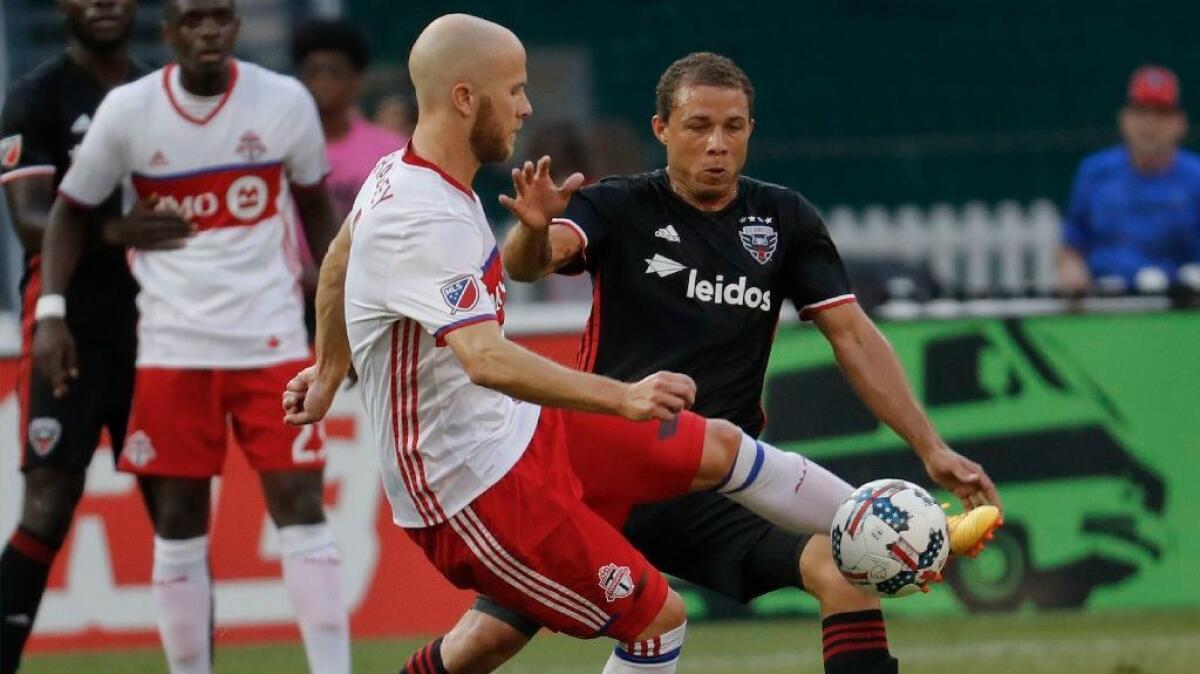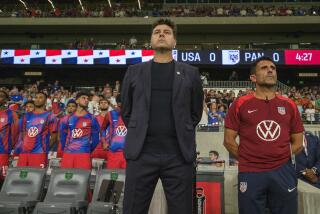Michael Bradley’s leadership and play has keyed turnaround for U.S. men’s soccer team

Reporting from HARRISON, N.J. — If last fall wasn’t the lowest point of Michael Bradley’s soccer career, he could certainly see the bottom from where he stood.
His club team, Toronto FC, had just become the first to lose an MLS Cup final despite not giving up a shot on goal. A month earlier, the U.S. national team had become the first to open the final round of World Cup qualifying with consecutive losses.
As the captain of both teams, Bradley had gone down with the ship twice. And he had grown tired of it.
So less than 10 months later, Bradley has willed himself and those around him to new heights: Toronto is on pace to become the most successful regular-season team in MLS history and the national team, which returns to World Cup qualifying Friday, is unbeaten this year.
Bradley says he’s not surprised by any of that.
“Yeah, I did envision it this way,” he said this week. “When you go through moments where things don’t go your way, there’s no time to feel sorry for yourself. There’s no time to stop.
“When you have a group of guys who understand that, who embrace that, who come in every day ready to leave everything else on the outside and give everything they have to make the group better, that’s when it starts to get fun.”
It’s certainly starting to get fun with the national team, which can move a big step closer to an eighth consecutive World Cup appearance with a victory over Costa Rica on Friday at Red Bull Arena. With four qualifiers left, the U.S. trails Mexico and Costa Rica in the six-team tournament, which will send three teams to Russia 2018.
“You get to this point in qualifying and it’s all there,” Bradley said. “All the work that we put in this year was for these next four games.
“It’s been a good year so far. But I also understand that we’ve not done anything yet. The biggest games are still to come.”
Bradley, 30, has done more than just talk a good game since Bruce Arena returned in December as coach of the national team. He has become a much better player.
As the midfield motor he has long been responsible for making the national team go, yet he disappeared for long stretches under former coach Jurgen Klinsmann, who often played him out of position. Arena, however, has dropped Bradley deeper and surrounded him with help and he has responded with some of the best soccer of his career.
“This is the same Michael Bradley that I’ve known for a long time. He’s been on an upward trajectory,” goalkeeper Tim Howard said of Bradley, whose father Bob coached the U.S. in the 2010 World Cup. “When you’re captain of your club and captain of your country and the son of a national team coach, there’s a lot of criticism that falls on your shoulders. And I think he’s handled it.”
Bradley’s impact extends far beyond the field. His intensity and piercing stare has unsettled more than a few teammates, not to mention journalists. He’s also among the most thoughtful players on the national team, answering questions in a quiet, deliberate style in which he parses every word, searching for just the right tone and meaning.
But he feels a responsibility to speak out, in words and deeds, on issues that go beyond sports, something he did last summer when he wore a rainbow captain’s armband after an attack on a gay nightclub in Orlando, Fla., and later when he called for national unity in the wake of the presidential election.
“He’s been one of the greatest captains I’ve played for,” said Howard, who has played behind Bradley on the national team since 2006. “To be a good leader is very hard. You have to wear it all the time. There’s no off-days in that regard. That’s what stands out most about him.
“He’s always training to make the team better, whether it’s a small conversation in the lunch room or whether it’s getting into a guy in the dressing room. He’s always on and I think that’s important [to being] a captain.”
If the last 10 months have shown Bradley anything, though, it’s that while captains get the credit when things go right, they also get the blame when things go wrong. And that’s a tradeoff the reinvigorated Bradley is comfortable with, especially now that the U.S. team appears to have found smooth sailing on its voyage to Russia.
“I continue to get better as I get older,” he said. “I love to play. I love to train. I love to compete. When those are your starting points, then it doesn’t feel like work.
“It’s never a burden for me to wake up in the morning and go off to training because it’s genuinely what I love doing.”
Follow Kevin Baxter on Twitter @kbaxter11








